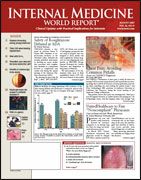Publication
Article
Internal Medicine World Report
Vaccine Shows Promise Against Early-Stage Breast Cancer
Author(s):
By Rebekah McCallister
BOSTON—A diagnosis of breast cancer has taken on a new meaning in the past 10 years, as research has produced a host of new therapies and detection techniques that have significantly improved long-term survival for women with this disease.
New initiatives are now under way that will try to apply some of these advances to methods of prevention that may reduce the total incidence of breast cancer. One such study, which evaluated a potential vaccine, has yielded promising results for women who are at high risk for this disease, suggest results presented at the recent American Association for Cancer Research's Frontiers in Cancer Prevention Research meeting.
Investigators examined a potential vaccine that would target overexpression of HER-2/neu protein in the cells in early-stage breast cancer, known as ductal carcinoma in situ (DCIS). It is estimated that 50% to 60% of DCIS is directly related to HER-2/neu overexpression.
A total of 12 patients with HER-2/neu overexpression were administered dendritic cells that had been treated with HER-2/neu to evoke an immune response. The women received 4 weekly vaccinations that were injected into normal lymph nodes in their groins. They were evaluated both pre- and postvaccination for immune response, HER-2/neu expression, and cell infiltrates.
All but 1 patient exhibited an initial immune response (indicated by the presence of anti-HER-2/neu?specific CD4+ T cells), and many patients developed protein antibodies to fight the HER-2/neu cells. Following treatment, the patients began to build up reserves of white blood cells and seemed to show long-term immune responses to HER-2/neu. Six of the women had markedly reduced HER-2/neu expression after vaccination that resulted in improvements in the severity of their disease.
"The results demonstrate for the first time that this vaccination may have significant clinical activity against certain types of breast cancer," said Brian J. Czerniecki, MD, of the University of Pennsylvania in Philadelphia. "We are confident that targeted treatment with this vaccine may effectively fight not only DCIS, but may extend to prevention of breast cancer entirely."





